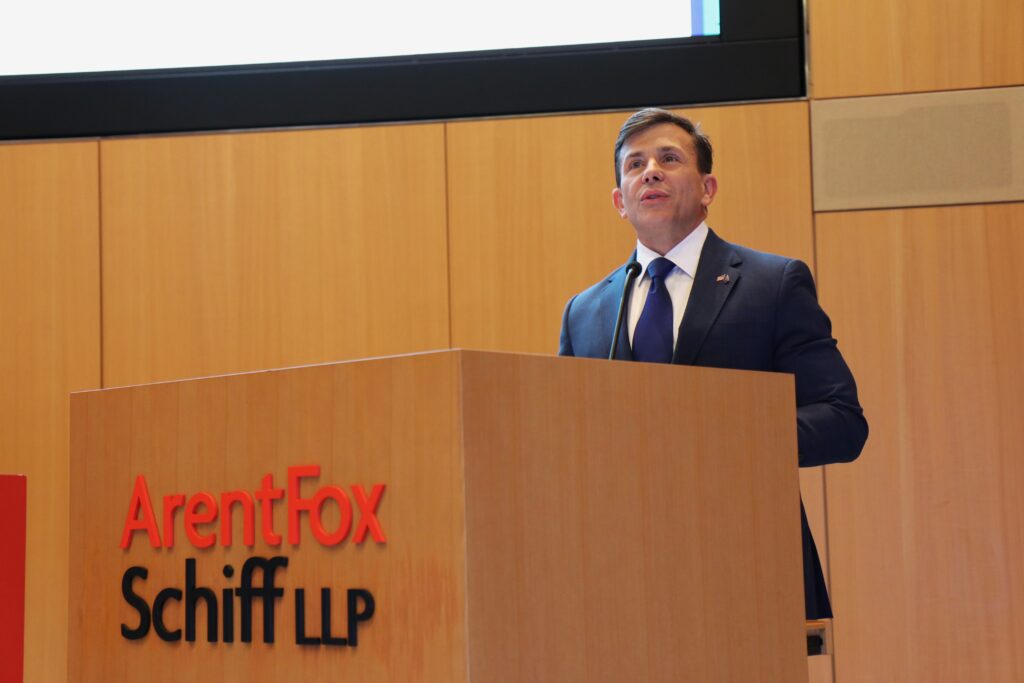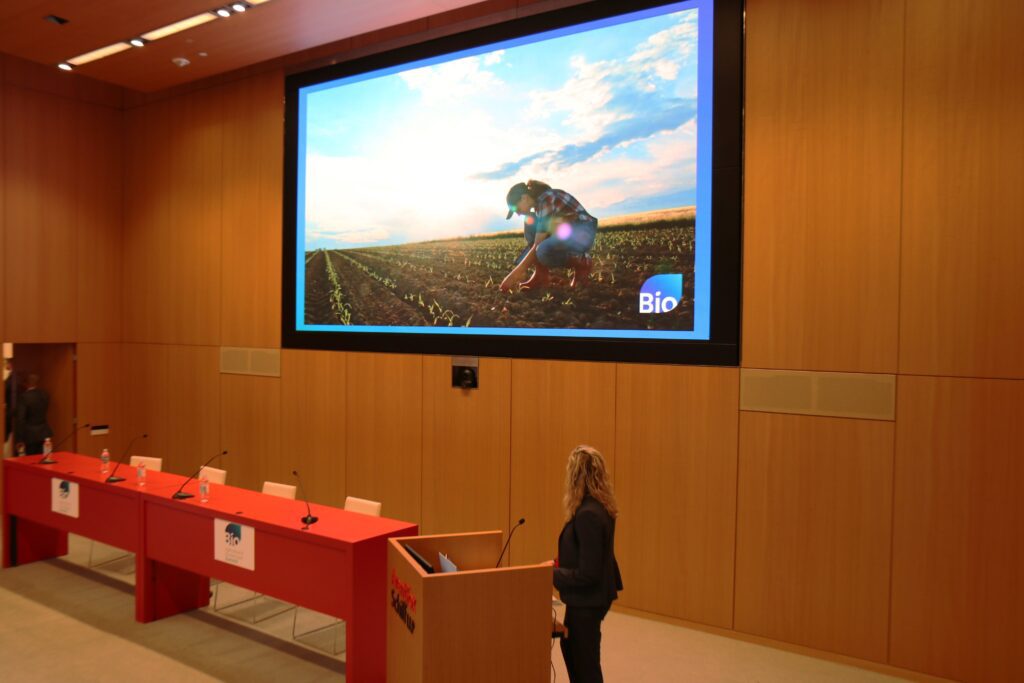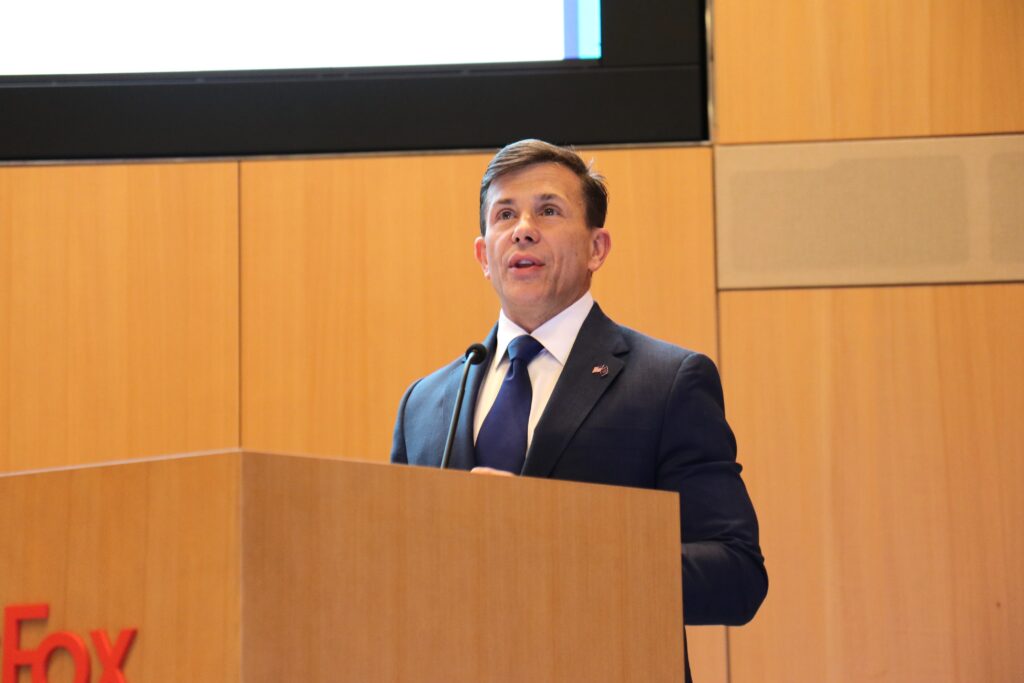On April 18, 2024, the Biotechnology Innovation Organization (BIO) held the inaugural Agriculture & Environment Summit in Washington, D.C., bringing together government and industry leaders to discuss innovation, regulation, and opportunities for biotech to address food security, climate change, and the need for sustainability. BIO President & CEO John F. Crowley opened the event with a discussion about the important role of biotech—here are his remarks as prepared for delivery.
My journey into biotechnology began more than 25 years ago. That’s when my two youngest children were diagnosed with Pompe disease. Pompe – as a few of you may know – is a rare and often fatal neuromuscular condition. My wife and I, along with our family, took their diagnoses hard. We prayed and tried to keep faith. But we knew that the road ahead would be difficult, and that our vision for our family was likely forever altered.
Through many trials and tribulations, we persevered. We maintained hope, raised money, worked with scientists, and put our fate in the hands of biotechnology. And today, decades later, our daughter Megan and our son Patrick are leading fulfilling lives thanks to advances in medicine and scientific innovation.
Our mission in biotech

A year after their initial diagnoses, I began work at Bristol Myers Squibb. Bristol Myers, like all good companies, has a strong and meaningful mission statement, which is to ‘extend and enhance human life.’ That is the company’s North Star, and one that I have tried to emulate throughout my career in our industry, as I have led companies that sought new cures and advancements.
Extending and enhancing human life is a guiding principle that all of us here share. Everything that our companies work on or that we—as advocates, regulators, or policymakers—strive to support revolves around improving the human condition. Whether you seek to develop new drugs like I did at Amicus, new crops, or emissions reductions, we all strive to make life better for people and this planet we call home. We have a shared mission and a shared passion.
It’s that passion for science that I want to put front and center today. Scientific advancement saved the lives of my children, and science will save our planet. Biotechnology aims to heal, fuel, and feed the world. We research and alter the building blocks of life in order to achieve these goals. We could be editing the genes of a human, an animal, or a plant. We could be reducing the odds of a disease mutation or the amount of carbon that reaches our atmosphere.
What’s key is this: it all falls into the same bucket of trusting and advancing biotechnology to safeguard our ability to live prosperously on this planet for centuries to come.
My commitment to agricultural and environmental biotech also stems from another passion of mine: global and national security. I attended the U.S. Naval Academy and served as a commissioned officer in the U.S. Navy Reserve. I was an intelligence officer and served in Afghanistan. I know that there are bad actors in the world that would like nothing better than to twist biotechnology for their own gains or to exploit weaknesses in American and global supply chains.
Any and all steps that our industry can take to increase our food supply and food security have my support. Additionally, the Navy is a leader in adapting to and mitigating the impacts of climate change. The department operates on the front lines of sea level rise and has released a climate action plan to address this existential threat. So, if there is ever a time when you think I might waver in my support for our climate mitigation work, know that the Navy Secretary would quickly straighten me out…
The fact is that the distance between biopharma and ag and environmental biotech continues to shrink. Human health technologies increasingly leverage biotech advances in food security, climate impact, and industrial applications. As extreme weather and rising seas affect how humans live, any artificial barrier between these sectors will further crumble. The One Health nexus will only grow.
BIO’s agriculture and environment advocacy

That is why BIO is not just proud, but also advantaged, by having a broad member base. When we – when I – head to Capitol Hill to advocate for the needs and potential of our industry, I do so as the representative of the widest array of lifesaving and planet-saving companies in our society.
As the world’s largest biotechnology advocacy organization, BIO will continue to fight for a domestic and global policy and regulatory climate that fosters the innovation we need to meet the agricultural, environmental, and medical challenges of today and tomorrow.
That means applauding the publication of the Biden administration’s Bold Goals for U.S. Biotechnology and Biomanufacturing, but also calling for more action to achieve these goals…
That means being able to separate the problematic parts of the Inflation Reduction Act for our industry from the beneficial ones…
That means recognizing advancements in regulations that define sustainable biofuels, but also calling out a burdensome regulatory process that is increasing the time and cost to bring a new genetically modified plant trait to market…
And it means appreciating the U.S. government for launching a dispute settlement process against Mexico for their unscientific ban on importing biotech corn, but also pushing to ensure that the resolution truly benefits affected manufacturers and allows exports to keep flowing…
Fighting for this kind of science-based trade enforcement is important for producers selling all around the world.
The power of storytelling
Achieving these goals will require telling the stories of the people and places affected by our collective successes and failures. I believe deeply in the power of storytelling. I believe that humans – with families and loved ones of their own – are moved by the plights and fates of one another. For years, I have used the stories of patients – including that of my own family – to demonstrate the power of biotechnology to save and improve lives.
To win greater support for our positions in food and climate, we must do the same. It could be telling the story of a GMO crop that can stay on the shelf longer, or a cleaner fuel that makes it easier to breathe. The point is that we all must communicate about these issues through the lens of storytelling to advance both our day-to-day policy and regulatory needs, as well as our broader biotech story.
At the heart of our story is this: biotechnology is a big word that means hope. Back in the year 2000, two years after our children’s diagnosis and in the very first week of my journey as a start-up biotech entrepreneur, I attended BIO’s convention in Boston. I sought partnering discussions, but no one signed up to meet with me. So, I wandered into the auditorium and listened to the evening’s keynote address. There, I heard a phrase that would forever shape my career and my life.
Christopher Reeve played Superman in the movies, but by then he had been in a wheelchair for five years, rendered a quadriplegic in a tragic accident. He had become an activist for people with disabilities and for medical research, and on the stage that evening he said biotechnology is another word for hope.
There was no cure for him, and there may not be one for climate change, but our members are researching game-changing food and climate therapies as we speak. Biotech isn’t just providing hope for patients with disease. It’s providing hope through scientific innovation for those at the mercy of climate change, food insecurity, and so much more.
‘You have an advocate’
Know that in me, you have an evangelist. You have an advocate. You have someone who knows, deep in his heart from personal experience, that science can break down the biggest barriers, the greatest challenges, and the most complex problems. BIO is a big, interconnected tent. We stand tall and we stand strong because of each of our tentpoles, and we need each of them to effectively advocate for a strong innovation ecosystem and the problem-solving potential of biotechnology.
Our moment is here. The technologies are converging. The needs are great. We may have great work before us, but you have my commitment, my passion, and my optimism. Let’s advance the coming age of biotechnology and heal, fuel, and feed the world together.




